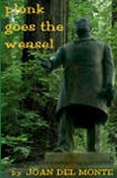Library
CAPER MYSTERY
PLONK GOES THE WEASEL
Plonktown, California, was founded by lumberman Josiah Plonk
in 1877 on the tidal plain of Humboldt Bay, about halfway
between San Francisco and the Oregon border. It was
a dozen miles north of Eureka, California, the county seat.
Plonktown and eureka fought a bitter election in 1900 to
be county seat and Plonktown won the election, but was disqualified
when Eureka boosters proved there were 62 votes cast by
Plonktown residents although there were only 60 registered
voters. The county seat election was a hundred years ago.
Neither city had forgotten.
The mountains, thick with redwoods, snag the fog and hold it to the east of town, where Humboldt State University is located on land given to the state because it was so mountainous it was considered unbuildable. Therefore, from any part of town except the flat flood plain called the Bottoms, the residents enjoy a view of the sweep of Humboldt Bay. When they can see it through the fog.
The coastal fog is a primary fact of life in Humboldt County. During World War II runways and barracks were built for a Navy airport called the Landing Aids Experiment Station, and important strategic research in fog dispersal was carried out in preparation for the bombing of Germany. This airport became the Humboldt Airport. It is a local joke that a builder from Southern California built a shopping mall which he called Bay View.
The fog psychologically forms the residents. Wrapped in that fog, like soft cotton batting, they come to consider themselves isolated from the world. Humboldt has a long tradition of ignoring federal authority. During Prohibition
the abundant Humboldt water produced bootleg whiskey which was trucked down to thirsty San Francisco. This was followed forty years later by a multibillion dollar marijuana industry, and Plonktown grocery stores sold books next to the cash register on how to grow better marijuana. The fog was a friend. it grew redwoods; hid things from people who shouldn't have been poking around anyway; and kept out some of the tourists.
The second fact of life in Plonktown was the scarcity of jobs. When Humboldt State University opened, Plonktown split into two rival groups for jobs, evenly divided. Currently there were 16,000 residents, including 8,000 students. This population split came to a crisis on the unlikely object of a small bird called
the Northern Spotted Owl.
Local environmentalists had recently got a vast area of old growth redwood declared off limits to logging because it was the habitat of the owl, a bird on the federal endangered species list. This resulted in a significant loss of
timber related jobs.
A timber workers' organization responded by contesting the permit for Humboldt County's largest entertainment event, the august music festival called Reggae on the River. The head of the timber workers pointed out that the location of the festival abutted an owl habitat and demanded an environmental impact report to determine whether reggae disturbed the birds.
"Maybe they prefer Sinatra?" sniffed the festival director. "This is the most ridiculous suit I ever heard of."
"Us rednecks are aware we're tacky and we're sorry to piss off the 7,000 yuppies come up to hear the music and sip their wine, but we're interested in protecting the spotted owl too, so it can be removed from the endangered species list and we can restore logging jobs."
"Oh come off it," the festival director snapped, "This is a pure attempt at lifestyle revenge. If you analyze the reggae festival demographics you'd find it's organized by and attracts many liberals who are against timber harvesting."
"Now maybe owls don't give a hoot about reggae. But we don't know that without an impact report."
"Oh, funny. this is the kind of thing those people think is funny, using the spotted owl against us, you can just see them poking each other in the ribs."
"We do have environmental laws and environmental laws are intended to be observed by everybody."
"I can't believe this act of pure vengeance, it won't help the timber industry stave off new regulations or win job retraining money; it will create resentment."
"Fair's fair."
It didn't help that a logger thrown out of work by the new Federal restrictions was not trained for the newly available jobs in systems analysis or environmental surveys. With the cutbacks in the lumber industry, HSU and its network of high tech industries became the major employers in Plonktown. so the locals considered the few service jobs that did exist--waiting tables, construction--theirs by right.
But with the cutback in college funding due to the state budget deficit, even these service jobs were now fiercely contested and usually taken by the students because they did better on tests. and some students liked the laid back Humboldt life style enough to take minimum wage jobs after they graduated, so that the bus driver might well have a Masters from HSU.
The locals viewed these young people, the men with single braids down their backs, the women fresh faced with their hair loose, as wealthy students supported by families in San Francisco and Los Angeles, playing at the Humboldt life. The students saw the locals as rednecks operating a good old boy network which froze them out of jobs because the locals guarded jobs for each other by passing the word on openings.
The locals tolerated the University. But Plonktown was not a tolerant town.
The mountains, thick with redwoods, snag the fog and hold it to the east of town, where Humboldt State University is located on land given to the state because it was so mountainous it was considered unbuildable. Therefore, from any part of town except the flat flood plain called the Bottoms, the residents enjoy a view of the sweep of Humboldt Bay. When they can see it through the fog.
The coastal fog is a primary fact of life in Humboldt County. During World War II runways and barracks were built for a Navy airport called the Landing Aids Experiment Station, and important strategic research in fog dispersal was carried out in preparation for the bombing of Germany. This airport became the Humboldt Airport. It is a local joke that a builder from Southern California built a shopping mall which he called Bay View.
The fog psychologically forms the residents. Wrapped in that fog, like soft cotton batting, they come to consider themselves isolated from the world. Humboldt has a long tradition of ignoring federal authority. During Prohibition
the abundant Humboldt water produced bootleg whiskey which was trucked down to thirsty San Francisco. This was followed forty years later by a multibillion dollar marijuana industry, and Plonktown grocery stores sold books next to the cash register on how to grow better marijuana. The fog was a friend. it grew redwoods; hid things from people who shouldn't have been poking around anyway; and kept out some of the tourists.
The second fact of life in Plonktown was the scarcity of jobs. When Humboldt State University opened, Plonktown split into two rival groups for jobs, evenly divided. Currently there were 16,000 residents, including 8,000 students. This population split came to a crisis on the unlikely object of a small bird called
the Northern Spotted Owl.
Local environmentalists had recently got a vast area of old growth redwood declared off limits to logging because it was the habitat of the owl, a bird on the federal endangered species list. This resulted in a significant loss of
timber related jobs.
A timber workers' organization responded by contesting the permit for Humboldt County's largest entertainment event, the august music festival called Reggae on the River. The head of the timber workers pointed out that the location of the festival abutted an owl habitat and demanded an environmental impact report to determine whether reggae disturbed the birds.
"Maybe they prefer Sinatra?" sniffed the festival director. "This is the most ridiculous suit I ever heard of."
"Us rednecks are aware we're tacky and we're sorry to piss off the 7,000 yuppies come up to hear the music and sip their wine, but we're interested in protecting the spotted owl too, so it can be removed from the endangered species list and we can restore logging jobs."
"Oh come off it," the festival director snapped, "This is a pure attempt at lifestyle revenge. If you analyze the reggae festival demographics you'd find it's organized by and attracts many liberals who are against timber harvesting."
"Now maybe owls don't give a hoot about reggae. But we don't know that without an impact report."
"Oh, funny. this is the kind of thing those people think is funny, using the spotted owl against us, you can just see them poking each other in the ribs."
"We do have environmental laws and environmental laws are intended to be observed by everybody."
"I can't believe this act of pure vengeance, it won't help the timber industry stave off new regulations or win job retraining money; it will create resentment."
"Fair's fair."
It didn't help that a logger thrown out of work by the new Federal restrictions was not trained for the newly available jobs in systems analysis or environmental surveys. With the cutbacks in the lumber industry, HSU and its network of high tech industries became the major employers in Plonktown. so the locals considered the few service jobs that did exist--waiting tables, construction--theirs by right.
But with the cutback in college funding due to the state budget deficit, even these service jobs were now fiercely contested and usually taken by the students because they did better on tests. and some students liked the laid back Humboldt life style enough to take minimum wage jobs after they graduated, so that the bus driver might well have a Masters from HSU.
The locals viewed these young people, the men with single braids down their backs, the women fresh faced with their hair loose, as wealthy students supported by families in San Francisco and Los Angeles, playing at the Humboldt life. The students saw the locals as rednecks operating a good old boy network which froze them out of jobs because the locals guarded jobs for each other by passing the word on openings.
The locals tolerated the University. But Plonktown was not a tolerant town.

